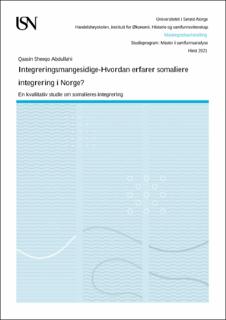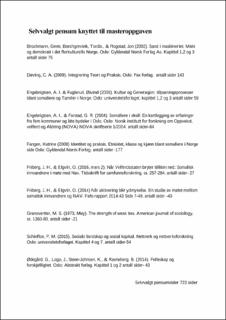| dc.contributor.advisor | Trond Løyning | |
| dc.contributor.author | Sheeqo Abdullahi, Qaasin | |
| dc.date.accessioned | 2021-11-18T17:41:15Z | |
| dc.date.available | 2021-11-18T17:41:15Z | |
| dc.date.issued | 2021 | |
| dc.identifier | no.usn:wiseflow:6353224:45851926 | |
| dc.identifier.uri | https://hdl.handle.net/11250/2830366 | |
| dc.description.abstract | Sammendrag
I Norge har integrering vært en stor del av samfunnsdebatten de siste 20 årene. Det finnes tidligere forskning på somaliere i Norge og funnene av disse studier tyder på problematiske sider av integrering. Formålet med studien har vært å få innsikt i hvordan sju utvalgte somaliere opplever integrering og hva de mener er betydningsfulle faktorer som påvirker integreringsprosessen. I min studie fokuserer jeg på informantenes erfaring med integrering og hva de selv mener er årsak til problemene rundt integrering, samt hvordan de forstår integrering. Videre undersøker jeg faktorer som kan både hindre og fremme somalieres integrering i Norge.
Jeg har brukt Nettverk og sosial kapital teori for å belyse datamaterialet, og anvendt analytiske begreper som integrering, assimilering, segregering og kultur. Studiens empiriske materiale bygger på kvalitative intervjue med sju somaliske menn som kom til Norge i en voksen alder. Analysen tar utgangspunkt i fenomenologiske tilnærminger og er delt i fire hovedtemaer; 1.Erfaring med integrering. 2.Ulike nettverksbetydning for integrering. 3.Kultur og religions rolle og 4.språk. Kategoriene forsøker å svare på problemstillingen og forskningsspørsmålene som inngår i denne studien. Analysen tar utgangspunkt i informantenes beskrivelser og jeg har brukt flere sitater som illustrerer hva deltakerne mener om teamet.
Resultatet viser at informantene ser integrering som nødvendig og et krav til å fungere som innbygger og borger i Norge og konsekvensene er negative for en ikke-integrert person i samfunnet. Integrering erfares som ensidig og somaliere og andre innvandrere blir ofte gjort ansvarlige for integreringsprosessen. Ulike krav settes for innvandrere hvilket viser til at det er mindre engasjement og gjensidighet fra majortitesside. Et viktig funn er at informantene gir uttrykk for at individuelt ansvar og innsats er viktig, til tross for all tilgengelig statlig og frivillige integreringsarbeid. Utfordringer på arbeidsmarked opplevelses negativ og svekker integrering på arbeidsarenaer. Det informantene legger til å være integrert er deltakelse i arbeidsliv, skole, relasjoner med nordmenn, god Norsk kunnskaper, forståelse av norsk system, regler og samtidig at man følger disse regler. Språk nivå, deltakelse i ulike nettverk, kulturelle forskjeller og religionspraksisser sees som betydningsfulle faktorer som har mye å si om informantenes integrering. | |
| dc.description.abstract | abstract
Integration has been a large part of the political and social debates in Norway for the past to decates. Previous studies have been done about somalis in Norway and the findings of these studies shows problematic aspects of integrasjon in the Norwegian society.The purpose of this master thesis has been to gain insight into how seven selected somalis expereince integration and what they believe are significant factors that affect the integration process. The focus in my study is the informants` experience with integration and what the informants mean is the cause of the problems around integration, as well as how they understand integration. Furthermore i examine factors that can both prevent and promote the integration of Somalis in Norway. I have used Network and social capital theory to illustrate the data material and applied analytical concepts such as integration, assimilation, segregation and culture. The empirical material of the study is based on qualitative interviews with seven Somali menn who came to Norway as an adults. The analysis is based on phenomenological approach and identified four main themes; 1.Experience with integration. 2. significance of different networks for integration. 3. the role of culture and religion and 4. language. The categories answer the research problem and the research questions that were formed in this study. The analysis is based on the informants' descriptions and I have used several quotes to illustrate what the participants think about the themes. The result shows that the informants see integration as necessary and required to function as a resident and citizen in Norway, and the consequences are negative for a non-integrated person in the society. Informants experience integration as one-sided and Somalis and other immigrants are often made responsible for the integration process. Different requirements are set for immigrants and it indicates that there is less commitment and matual responsibility from the majoritetsside. A key finding is that the informants express that individual responsibility and efforts are important, despite all available government and voluntary integration work. Challenges in the the labour market are seen as negatively that weakens integration in the workinglife. What the informants relate and describe to being integrated is participation in working life, schools, relations with the Norwegians, good Norwegian language knowledge, understanding the system, rules of Norway and at the same time following these rules.
Language level, participation in different networks, cultural differences and religious practices are seen as significant factors and have a lot to say about the informants' integration. | |
| dc.language | nob | |
| dc.publisher | University of South-Eastern Norway | |
| dc.title | Integreringsmangesidige-Hvordan erfarer somaliere integrering i Norge? En kvalitativ studie om somalieres integrering | |
| dc.type | Master thesis | |

